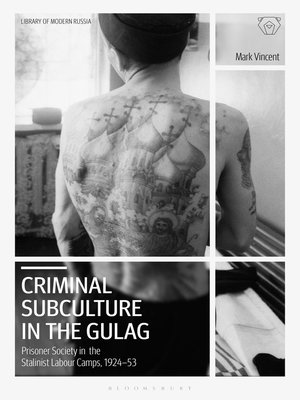Criminal Subculture in the Gulag
ebook ∣ Prisoner Society in the Stalinist Labour Camps · Library of Modern Russia
By Mark Vincent

Sign up to save your library
With an OverDrive account, you can save your favorite libraries for at-a-glance information about availability. Find out more about OverDrive accounts.
Find this title in Libby, the library reading app by OverDrive.



Search for a digital library with this title
Title found at these libraries:
| Library Name | Distance |
|---|---|
| Loading... |
Despite growing academic interest in the Gulag, our knowledge of the camps as a lived experience remains relatively incomplete. Criminal Subculture in the Gulag, in its sophisticated analysis of crime, punishment and everyday life in Soviet labour camps, rectifies this.
From Gulag journals and song collections to tattoo drawings and dictionaries of slang, Mark Vincent draws on often-overlooked archival material from the Moscow Criminological Bureau to reconstruct a fuller picture of Gulag daily life and society. In thematic chapters, Vincent maps the Gulag 'penal arc' of prisoners across initiation tests, means of communication, the importance of card playing, punishment rituals and the notorious 1948-52 cyka ('bitches') internal prison war between military veterans and vory-v-zakone. Most importantly, this timely examination of crime and punishment in modern Russia also highlights the lines of continuity between the Gulag systems, late Imperial Katorga,and today's Russian mafia.
As such, this impressively interdisciplinary volume is important reading for all scholars of 20th-century Russia as well as those interested in international criminality and penology.
From Gulag journals and song collections to tattoo drawings and dictionaries of slang, Mark Vincent draws on often-overlooked archival material from the Moscow Criminological Bureau to reconstruct a fuller picture of Gulag daily life and society. In thematic chapters, Vincent maps the Gulag 'penal arc' of prisoners across initiation tests, means of communication, the importance of card playing, punishment rituals and the notorious 1948-52 cyka ('bitches') internal prison war between military veterans and vory-v-zakone. Most importantly, this timely examination of crime and punishment in modern Russia also highlights the lines of continuity between the Gulag systems, late Imperial Katorga,and today's Russian mafia.
As such, this impressively interdisciplinary volume is important reading for all scholars of 20th-century Russia as well as those interested in international criminality and penology.







